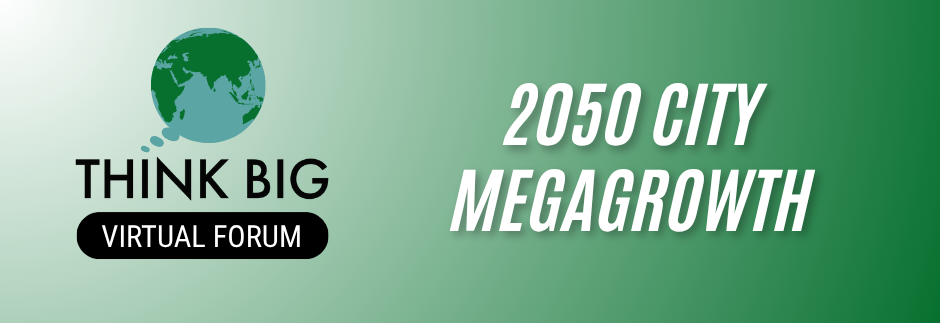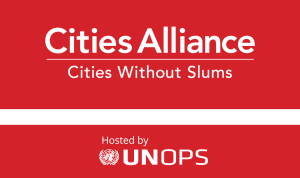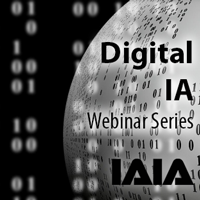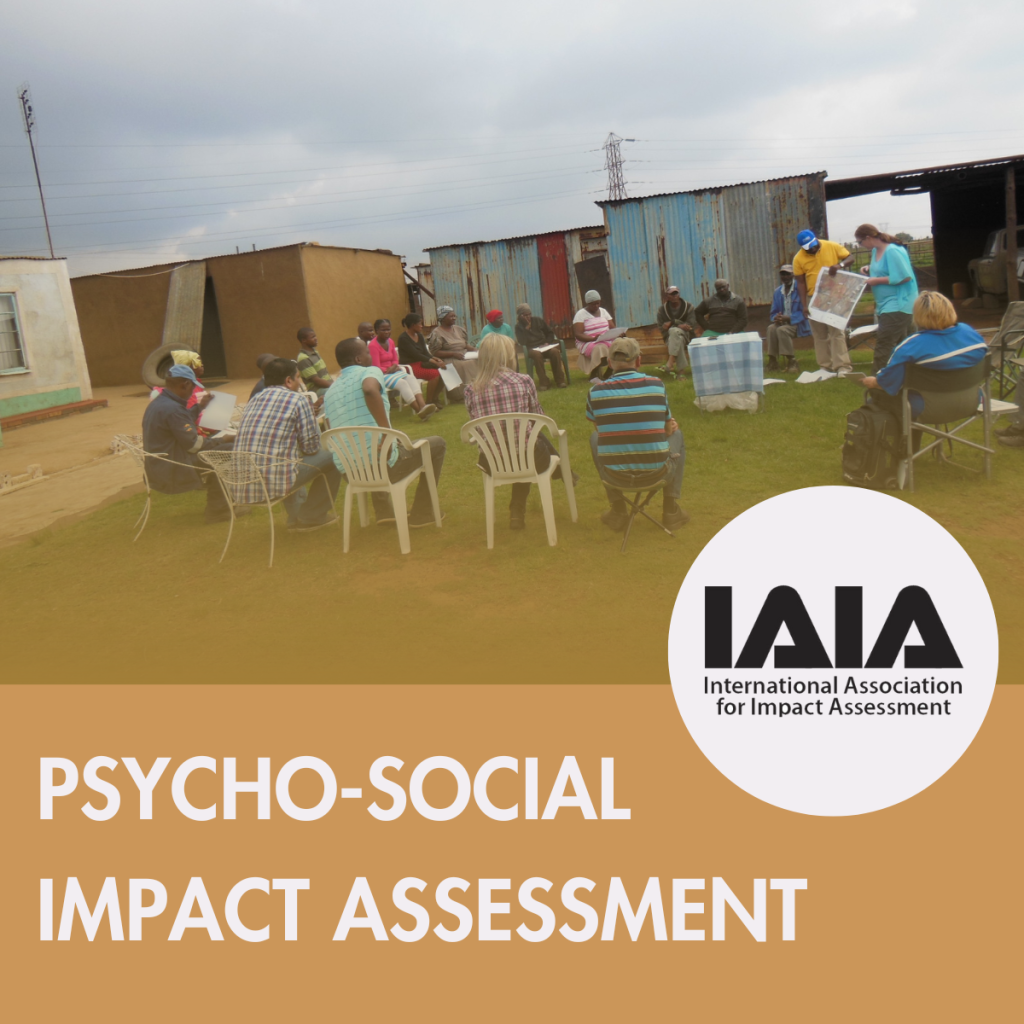
2050 CITY MEGAGROWTH — ASSESSING AND ADDRESSING THE IMPACTS (PART II)
A multi-part virtual forum exploring how impact assessment can guide megacity growth toward planetary sustainability
What are the potential impacts of megacity urbanization to 2050 and beyond on climate as well as other planetary boundary issues? How can IA processes help select among alternatives to address these impacts? In particular, what role should Strategic Environmental and Social Impact Assessment and long-term Cumulative Effects Assessment (CEA) play in informing planning and policymaking to address these issues?
Think Big Virtual Forum: 2050 City Megagrowth reviews the potential impacts of megacity urbanization to 2050 and beyond on climate as well as other planetary boundary issues. It also examines potential preferred alternatives for mitigating these impacts through IA processes, particularly Strategic Environmental and Social Impact Assessment and long-term Cumulative Effects Assessment (CEA).
Each session discusses topics/issues of interest to general audiences, IA practitioners, urban and regional planners, and policymakers.
For Part 1 of this series, two pre-recorded panel presentations were released in March 2023, followed by a live panel discussion for Q&A with attendees and panelists. For Part II, two pre-recorded panel presentations were released in July 2023, also followed by a live panel discussion with Q&A.
Panel 4: 2050 City Megagrowth and the Value of Impact Assessment
This session highlights how impact assessment can support more sustainable and inclusive urban futures. Peter Croal examines how community groups in Ottawa are mobilizing to address environmental, housing, and infrastructure challenges amid increasing climate impacts. Karen Shippey critiques current approaches to urban informality, advocating for restorative development that leaves no one behind. Ahmed Sanda offers a thought-provoking exploration of impact assessment’s role, drawing on science, philosophy, and planning to reimagine its purpose in mitigating urban risks while enhancing societal values. Moderated by Heather M. H. Goldstone of Woodwell Climate Change Research Center.
Panel 5: 2050 City Megagrowth - The Role of Planning, Finance and Impact Assessment
This session explores how planning tools, finance, and impact assessment can help cities adapt to climate change and support resilient growth. Philippa Burmeister reviews existing planning and environmental tools, emphasizing their role in mainstreaming climate resilience. Willemien Van Niekerk presents South Africa’s GreenBook, an online tool offering data-driven climate risk insights and adaptation actions. Jeremy Gorelick highlights barriers to accessing climate finance in developing countries and opportunities for technical support. Finally, Susanne H. Fischer shares Basel’s experience developing and implementing a climate adaptation strategy, underscoring the need for strong political commitment and knowledge exchange. Moderated by Heather M. H. Goldstone of Woodwell Climate Change Research Center.
Panel 6: Think Big Live Forum
This 75-minute live panel discussion featured real-time Q&A with attendees and panelists from Panels 4 and 5, plus commentary by Garry Middle (VisionEnvironment) and Weston A. Fisher (Co-Chair, IAIA’s Climate Change Section). Moderated by Heather M. H. Goldstone of Woodwell Climate Change Research Center.
Meet the Experts
Panel 4: Peter Croal, Karen Shippey, and Ahmed Sanda
Peter Croal is a Fellow of the Royal Canadian Geographical Society and has a B.Sc., Geology Degree from Carleton University (1979) and has been working in the field of environmental assessment and international development for over 40 years. He focuses on the relationship between environmental management, climate change, resource extraction, and poverty reduction in developing countries and the Arctic. Peter has been a member of IAIA since 1994.
Karen Shippey has a Master’s from the University of Cape Town and over 25 years of experience. As an EIA practitioner for 15 years she focused on infrastructure projects. Moving into regional government in 2011 she became a senior manager in the Western Cape province of South Africa. She is responsible for leadership across the Provincial Climate Change, Green Economy, Sustainability, Biodiversity and Coastal Management portfolios. Since 2017 she has also become the Gender Focal Point for the Department and developed a passion for gender mainstreaming.
Ahmed Sanda is an Impact Assessment Consultant, with background in Economics and Environmental management/Science. He is the co-chair IAIA Tech group, engaging with Urban planners and Decision makers. He lives and runs a consultancy firm (Ashawa Consultancy) in Nigeria.
Panel 5: Philippa Burmeister, Willemien Van Niekerk, and Dr. Jeremy Gorelick
Philippa Burmeister has been involved in integrated environmental management for the past 20 years. Her career started in planning which, with her environmental qualifications, resulted in a focus on identification of environmental opportunities and constraints to ensure sustainable use of natural resources to efficiently meet socio-economic needs. More recently she has specialized in Air Quality and Climate Change.
Willemien Van Niekerk is a principal researcher at the Council for Scientific and Industrial Research in South Africa. A professional urban planner, she has over 25 years’ experience as a consultant, lecturer and researcher working in multi- and interdisciplinary environments. She is an innovator, developer, and manager of the GreenBook project.
Dr. Jeremy Gorelick is a development finance practitioner with over 20 years of experience in capital for climate-smart urban infrastructure. He has advised bilateral and multilateral aid agencies and development finance institutions on the most effective programming for their contributions towards a more sustainable planet, resulting in over US$ 4 billion in flows and transactions closed.
MODERATOR: Heather M. H. Goldstone
Heather M. H. Goldstone of Woodwell Climate Change Research Center. Heather is a science communicator working to put climate science in the hands of those in a position to make real-world change. She holds a Ph.D. in ocean science from M.I.T. and Woods Hole Oceanographic Institution, and she brings to her work a decade of experience in research and another decade in journalism. She is an award-winning journalist who founded and hosted Living Lab Radio on Boston Public Radio, a weekly live-interview show about science and society, and also hosted Climatide, a US National Public Radio blog exploring the impacts of climate change on coastal communities. Her research has been featured on U.S. National Public Radio’s Morning Edition, U.S. Public Broadcasting Service News Hour, The Takeaway, and Public Radio International (PRI’s) The World.
More about the Forum
Many scientists assessing the impacts on the earth’s carrying capacity and global planetary boundaries from human activities have concluded that there is great urgency to find and select among best alternatives to address potentially catastrophic impacts on earth and human systems.
Policymakers and the public urgently need to be able to select among the best environmentally and socially sound options to manage these impacts.
In response, the International Association for Impact Assessment (IAIA), in collaboration with Cities Alliance and ISOCARP, has organized a series of presentations supporting efforts to address looming environmental and social impacts affecting the world’s cities to 2050 and beyond.
Of the 8 billion of us on Earth:
- Around 4.4 billion people or 56% of the world’s population live in cities, with the urban population expected to more than double its current size by 2050, meaning nearly 7 of 10 people will live in cities.
- Currently, there are 33 megacities (10 million people or more), with 47 projected by the end of 2050, a trend considered unsustainable by many specialists.
- Cities account for two-thirds of global energy consumption and more than 70% of annual global carbon emissions, and most of these emissions come from industrial and motorized transport systems using fossil fuels.
Additional Background
Of great concern to planners and impact assessment specialists is that conservatively 900 million people live in slums, but most experts agree that including different types of informal settlements, the number goes up to 1.6 billion – which represents 1/4 of the world’s urban population. Stemming urban poverty is critical to addressing climate change and other global environmental and social impacts, which is a focus of Cities Alliance’s work and strategy. Notably, there are up to a half billion youth living in informal settlements with inadequate and hazardous water and sanitation, poor health and nutrition, little or no access to education, and poor or non-existent employment opportunities. Addressing climate change and other global commons issues must at the same time come to grips with this level of urban poverty, especially among youth.
Simply defined, impact assessment is the process of identifying the future consequences of a current or proposed action. As an association of interdisciplinary environmental and social impact assessment professionals, IAIA is uniquely positioned to support the assessment of alternative strategies for solving current issues of global and local significance. We are convinced that equipping mayors and urban policymakers with sound urban planning and impact assessment processes (with full public engagement), will help lead the transition to ‘true’ sustainability.
IAIA’s Climate Change Section has organized the forum, specifically the Section’s Technical Advisory Group tasked to engage with urban planners and decision makers.







